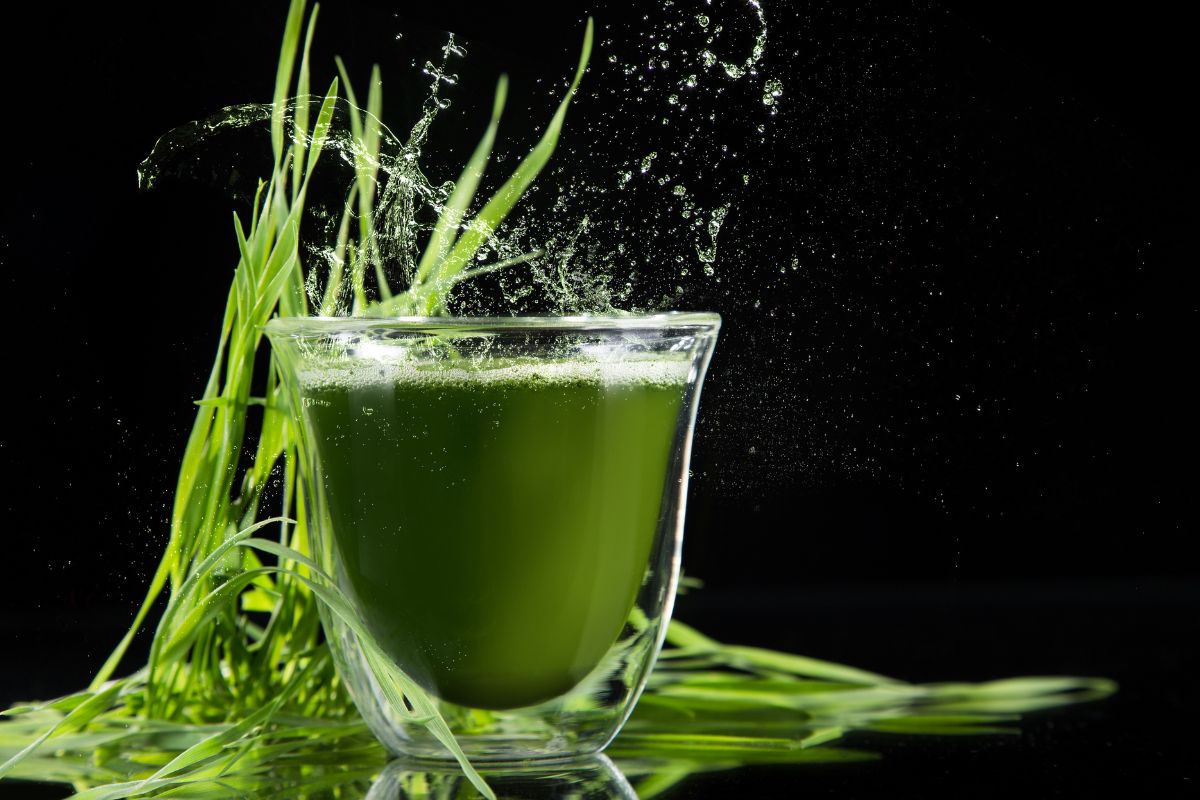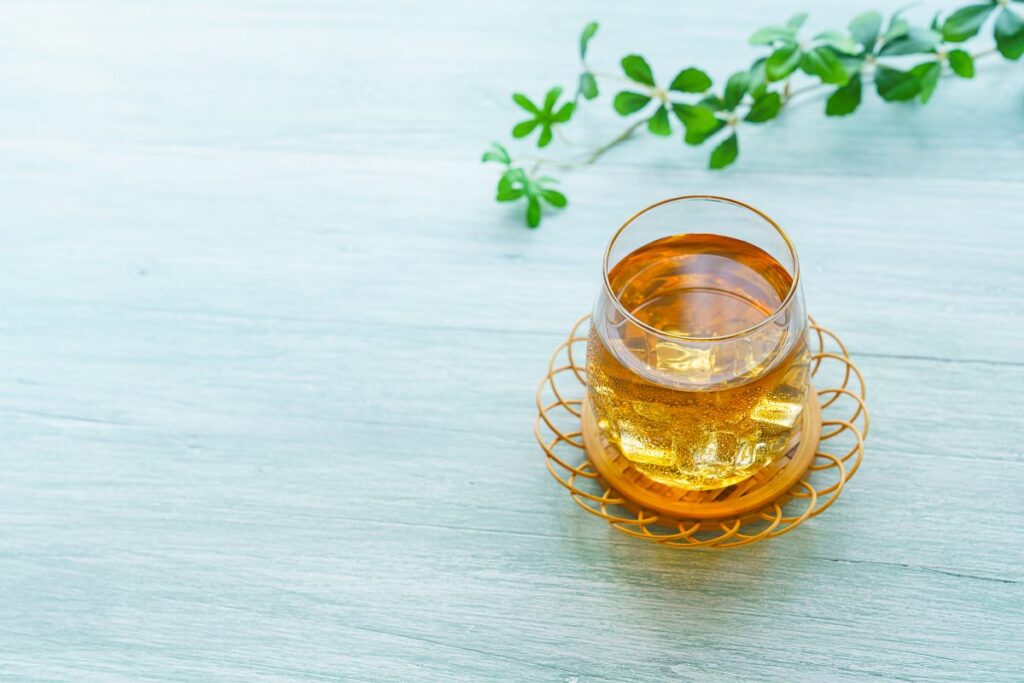Barley tea is often drunk in East Asian countries, including China, South Korea, Taiwan, and Japan.
The drink is sourced from roasted barley and can be enjoyed cold and hot. It has a gentle amber hue and a light, slightly bitter taste.
Barley tea is known for its potential health benefits. It’s been used in traditional Chinese medicine to treat inflammation, diarrhea, and tiredness.
We’ll cover more about barley tea in this post, including its health benefits, possible drawbacks, and how to make it.
What Is Barley Tea?
Barley is a grain that contains gluten. Like a lot of different grains, dried barley grains can be used for various purposes.
These include being refined into flour, added to stews and soups, cooked for recipes, and made into tea.
Barley tea is usually made by brewing roasted barley with hot water. Some East Asian locations stock tea bags with ground roasted barley inside, which make it easier to prepare the tea.
Whole barley is full of minerals and vitamins, like zinc, manganese, and iron. Despite its nutrition profile, it’s hard to know how much of the nutrients spread into the tea as the barley was being steeped.
Barley tea isn’t usually sweetened, but some choose to add cream or milk to their cup.
In South Korea, barley tea is occasionally blended with roasted corn tea to make it sweeter. Some stores in Asian countries sell sweet barley tea in bottles.
Barley water is different from barley tea, but it is also popular in East Asian locations. Instead of steeping the kernels, raw barley is boiled in water to infuse the liquid with its flavor.
You can choose to leave the kernels in the water or remove them while you drink the water.
Barley water is also popular in other countries around the world, like Spain and Mexico, though it’s usually sweetened in these areas.
Barley Tea Benefits
Older medicine traditions have prescribed barley tea to treat a variety of issues, like inflammation, fatigue, and diarrhea.
Despite this, a lot of these uses have not been backed up with scientific evidence.
Nevertheless, barley tea is generally safe to enjoy and may have a few health benefits.
Very Low In Calories
Barley tea is very low in calories, in some cases, practically calorie-free. Its total calories and carbohydrate content will vary based on how strong you make your brew.
Still, even if you make a strong cup, the calorie content won’t be enough to affect your daily energy intake.
This is why it’s a tasty and healthy substitute for water, particularly for people attempting to lose weight.
However, this is only the case if you enjoy a cup plain, without any added sugar, sweetener, cream, or milk.
Full Of Antioxidants
Antioxidants are compounds within plants that can prevent cell damage from free radicals.
Free radicals are particles that can lead to inflammation and cell damage if they accumulate within your system.
Barley tea contains many antioxidants, like vanillic and chlorogenic acids.
These are ideal for anyone struggling with excess weight, as they can increase how much fat the body burns when it’s resting. Both of these antioxidants also have anti-inflammatory properties.
Quercetin, another potent antioxidant, is present in barley tea. It may help to improve blood pressure, brain health, and heart health.
Anti-Cancer Effects
As barley is so rich in antioxidants, it may have cancer-prevention properties.
Research that looked into cancer mortality and local barley growth found that cancer mortality was higher in areas with lower barley growth and consumption.
However, additional human research is needed to look into these barley’s anticancer properties. These findings don’t mean that low barley intake will lead to cancer.
Drawbacks Of Barley Tea

Barley tea may have some health benefits, but there are some downsides you should be aware of too.
Acrylamide Risks
Even though barley tea may have anti-cancer properties, trace amounts of a possible cancer-causing substance, known as acrylamide, are present within.
Research has provided mixed findings, so more studies are needed to look into acrylamide’s potential effects.
For instance, findings from a meta-analysis discovered that dietary acrylamide intake had no link to the possibility of common cancer varieties.
However, a different study found that greater acrylamide intake was linked to a greater risk of pancreatic and colorectal cancer.
If you are worried about acrylamide, avoid lightly roasted barley and barley tea bags, as these release greater amounts of the substance.
You can reduce the amount of acrylamide in barley tea by roasting your barley grains to a darker hue before you brew them.
Not Gluten Free
Barley tea is made from barley, a grain that contains gluten. This means that the tea isn’t suitable for anyone who needs to avoid grains or is on a grain-free diet.
Weight Management
If you often drink barley tea, it’s important to control the amount of cream and sugar you add to the brew.
With a few additions, barley tea can turn into a considerable source of fat, sugar, and excess calories.
Preparing Barley Tea
Barley tea is enjoyed a lot in Asian countries and is often used as an alternative to water. Barley is relatively safe, so you can drink a few glasses a day without worrying.
You can prepare barley tea by roasting barley grains at home, or by purchasing premade barley tea bags from Asian grocery stores or online.
- To begin, roast barley by adding raw kernels to a hot, dry skillet. Increase the heat to medium and stir regularly for ten minutes, or when the kernels have turned brown.
Make sure you let the barley change to a deep brown hue, as this will reduce the acrylamide present within.
- You’ll need three to five tablespoons of dry roasted barley for every eight cups of water. This works out to 30 to 50 grams of barley or one to two tea bags for every two liters of water.
- Brewing the tea involves steeping the roasted barley (or teabags) in hot water for five to ten minutes.
- Next, strain out the kernels to leave the remaining tea, but you can leave them in if you prefer.
You can enjoy barley tea with sugar, a splash of milk, or a little cream, but it tastes great on its own too!
Final Thoughts
Barley tea is often enjoyed in East Asian locations. It’s known for its health benefits but is often enjoyed as a recreational drink.
Barley tea is very low in calories, full of antioxidants, and has potential anti-cancer properties. Despite this, more studies are needed to look into its possible health benefits.
A drawback to consider is that barley tea does contain small amounts of acrylamide, a substance that may lead to cancer. It’s also unsuitable for anyone that needs to avoid gluten.
More research is needed to look into acrylamide’s effects, but if you’re worried, roast the barley grains well so they turn dark brown before you brew them.
Overall, barley tea may improve your antioxidant intake to prevent cell damage, so it’s worth considering if you’re looking to enjoy a different beverage.








